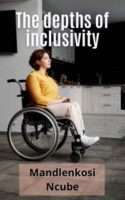I followed closely the political parties’ rallies for the municipal elections a few months ago. They promised us free houses, free education and economic liberation. The ANC went as far as to promise us electric powered cars.
How about introducing more buses for people with special needs and improving our infrastructure to include people with special needs?
This is a heart breaking topic. All we talk about is improving our way of life but there are people in the backseat of our minds that are side-lined at thought. These are people that carry the weight of the world on their shoulders. These are the people that cannot go outside their homes unless it’s really necessary because our country does not cater or include them in our daily life. These are people go through the most but no one dares to stretch out a hand and help – not even our politicians.
All they do is build a wheelchair ramp next to a stair case or install elevators that they will not maintain and forget about their daily needs. How often do we find disabled people enjoying theme parks, local parks or even using a public toilet ekasi? Hence I take it upon myself to bring the question to the table.
Are our public facilities inclusive of people’s different needs especially those of our fellow South Africans that are living with disabilities? I once got into a taxi with a man who was in a wheelchair. It took him approximately ten minutes to get settled into the front seat and for the driver to put his chair into the boot whilst complaining to him for being a burden. Some commuters stared at him inhumanly.
After the whole squabble with the driver the man relaxed and closed his eyes as the taxi drove off. All I could think about for the rest of the ride was what was going to happen to him when he gets to his drop-off point…are there no taxis or buses to help cater for his needs without making him seem like a burden to people?
That is one of many horror stories that we hear about – the public humiliation of people living with disabilities. How far does this really have go for the government to fully include our brothers and sisters with special needs into the infrastructure and other things they need access to?
Moreover, SA is home to over 3 million people that live with disabilities. Each time they go out they have to be accompanied by someone else to ensure that they are safe or that they can access things. Even though the government has been considerate enough to provide them with buses that can carry people on wheelchairs and apps that help them keep track of where they are and what to do when they feel threatened or unsafe, there is always room for improvement. This puts a lot of stress onto making sure that every public and private space is inclusive of those with special needs.
It was published by www.groundup.org.za that a mall called Nyanga Junction is an example that the public infrastructure is not inclusive of people living with disabilities at all. Residents who are on wheelchairs \often complain about the wheelchair ramp is too small and the lifts in the mall do not work .They usually have to pay a person up R100 to be carried up the stairs and to help them carry out any other activity.
This article is a bright highlighter to the struggles that our brothers and sisters living with disabilities face every day. To think that someone has to include a certain amount of money in their budget just to be accompanied by someone else in public is horrific in 2021. Why are still discussing issues of inclusivity in a world that had modernised so much? What is pulling us back from civilization that incorporates everyone’s needs in society?
In the city of Cape Town, the government has offered a Dial-a-Ride service fir the disabled. This is an app whereby disabled people book a ride in advance but it is often fully booked so some people cannot depend on the service. This leaves them stranded with only the choice to hire private taxis that can accommodate their needs. These taxis can also be expensive. Those who cannot afford the luxury of a private cab opt to pay for two seats in a taxi as they need more space to be free than others. Sometimes taxis refuse to take them because commuters have zero tolerance to wait for them to tip their wheelchairs into the cars.
There are initiatives that the government is taking to curb this huge gap in accessibility and also organisations that advocate for people with special need to be included in every aspect of life. These include giving disabled people the opportunity to drive the change themselves by airing out their needs and participating in decision. Manje that has to do with building public spaces so that they set out their specific needs and they are easy for them to access. This also ensures that disabled people are part of the solution as they are ready to contribute their lived experiences to the problem solving. They too deserve a seat at the table.
The fact is that only poor disabled people who live in our impoverished kasis are the ones who suffer the most. However, they are safe in our communities with our spirit of Ubuntu
Change will never take a night to happen but taking baby steps into the right direction will lead us into light.
Suffice as to say that the government might gamble with a lot of things when running the country bur depriving people of their freedom to move around and enjoy their country is another level of inhumanity that we should put forward on the table. Here is some food for thought.


